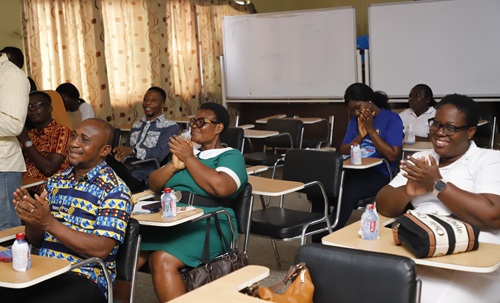
Rotary Club of Accra-Dansoman launches anti-cervical cancer project
The Rotary Club of Accra-Dansoman in partnership with the Rotary Club of Calgary Downtown, Canada, has launched a six-month cervical cancer training, screening and treatment project.
The initiative aims to screen over 1,000 women and select 10 nurses from various hospitals across the country to undergo training at the Cervical Cancer Training and Prevention Centre at the Battor Catholic Hospital in the Volta Region, to enhance their capacity for effective screening and treatment.
The training will take place in two sessions from February 3 to 14 this year and from March 3 to 14 this year.
The nurses will form the first cohort of specialists for cervical cancer screening, community education and treatment.
The Rotary Clubs of Ho, Accra Spintex, Cape Coast Central and Winneba , as well as health professionals across the country, are also collaborators of the project.
Rationale
The Charter President of the Rotary Club of Accra-Dansoman, Francis Dowetin, said the initiative was to reduce the mortality rate and address the low cervical cancer screening frequency in the country.

He said cervical cancer was a preventable disease and the club wanted to create a lasting change and save lives in the country.
“We want to ensure that people are informed and empowered to take preventive measures,” Mr Dowetin stated.
He stressed the need for public-private partnerships in cervical cancer handling, saying, “The government alone cannot cover everywhere, and that’s where institutions such as Rotary come in.
As a humanitarian organisation, we are stepping up to train more nurses, screen more cases and help people lead healthier lives.”
Mr Dowetin gave the assurance that the club was committed to ensuring the success and sustainability of the project adding that, “Women found to be at risk will receive immediate treatment or referrals for further care”.
The Project Chair of the Rotary Club of Calgary Downtown, Eben Mensah, said the project was to detect cervical cancer at its earliest stages and ensure timely treatment.
“Despite the gravity of the situation, screening rates remain alarmingly low, with fewer than 5 per cent of women being screened for the disease,” he said.
The project, he said, would also introduce the human papillomavirus (HPV) vaccination which prevented cervical cancer, and provide education on HPV and its long-term effects.
Statistics
A Public Health Physician and Head of Trust Hospital Premium Centre, Dr Jeffrey Amissah, revealed that approximately 2,797 women in Ghana were diagnosed with cervical cancer every year and 1,699 died from the disease.

He added that cervical cancer was the fourth most common cancer in women globally, with over 660,000 new cases worldwide in 2022 and more than 350,000 deaths.
Dr Amissah said experts were of the view that without scaling up prevention, screening and treatment, the number of deaths from cervical cancer could increase by nearly 50 per cent by 2040.
HP
Dr Amissah explained that cervical cancer is caused by a persistent infection with high-risk strains of HPV, which leads to the abnormal growth of cells in the cervix resulting in cancer.
He said while HPV affected women, it also posed risks to men, causing conditions such as genital warts and other cancers.
“HPV is primarily transmitted through sexual contact, although non-sexual transmission is possible through shared undergarments or poor sanitation in public facilities,” he explained.
